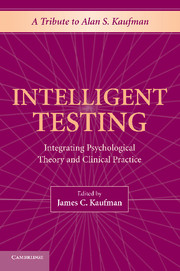Book contents
- Frontmatter
- Contents
- Acknowledgments
- Alphabetical List of Authors and Affiliations
- PART ONE THOSE WHO KNOW HIM
- PART TWO INTELLIGENT TESTING
- PART THREE THE INTERSECTION OF THEORY AND MEASUREMENT
- PART FOUR KAUFMAN ACROSS THE WORLD
- 12 The K-ABC in France
- 13 Dr. Alan Kaufman's Contribution to Japan: K-ABC, Intelligent Testing, and School Psychology
- 14 Alan Kaufman's Deep Influence in Sweden
- 15 Intelligent Testing of Underserved Populations
- 16 Alan S. Kaufman: The Effects of One Man's Extraordinary Vision
- Author Index
- Subject Index
- References
13 - Dr. Alan Kaufman's Contribution to Japan: K-ABC, Intelligent Testing, and School Psychology
Published online by Cambridge University Press: 05 August 2012
- Frontmatter
- Contents
- Acknowledgments
- Alphabetical List of Authors and Affiliations
- PART ONE THOSE WHO KNOW HIM
- PART TWO INTELLIGENT TESTING
- PART THREE THE INTERSECTION OF THEORY AND MEASUREMENT
- PART FOUR KAUFMAN ACROSS THE WORLD
- 12 The K-ABC in France
- 13 Dr. Alan Kaufman's Contribution to Japan: K-ABC, Intelligent Testing, and School Psychology
- 14 Alan Kaufman's Deep Influence in Sweden
- 15 Intelligent Testing of Underserved Populations
- 16 Alan S. Kaufman: The Effects of One Man's Extraordinary Vision
- Author Index
- Subject Index
- References
Summary
In my thirties I studied and worked in the United States from 1981 to 1990. Starting with the Alabama Language Institute, I went on to pursue a psychology major at the University of Montevallo, and finally finished a PhD in school psychology with Dr. Alan S. Kaufman as my thesis supervisor and mentor. I was able to conclude my journey from ABC (English lessons at Alabama Language Institute) to PhD and start school psychology services in Japan thanks to Drs. Alan and Nadeen Kaufman.
I first came to know about Kaufman in 1985 through Kaufman Assessment Battery for Children (K-ABC) (Kaufman & Kaufman, 1983), which was the textbook for psychological testing at the University of Montevallo. I was very interested in the K-ABC, which consisted of subtests that can be used for Japanese children because of the low loading of language and cultural factors. Immediately, I strongly felt that I should translate the K-ABC into Japanese even when I was still an undergraduate student (though I was 34 years old!). Dr. Julia Rogers, professor of psychology at the University of Montevallo, was so kind that she introduced me to Dr. Alan Kaufman at the University of Alabama. I was brave enough to talk to Dr. Kaufman about “the Japanese K-ABC.” Dr. Kaufman treated me as a psychologist from Japan without measuring my intelligence or achievement and expressed a strong interest in the Japanese version of K-ABC.
- Type
- Chapter
- Information
- Intelligent TestingIntegrating Psychological Theory and Clinical Practice, pp. 183 - 190Publisher: Cambridge University PressPrint publication year: 2009
References
- 1
- Cited by



